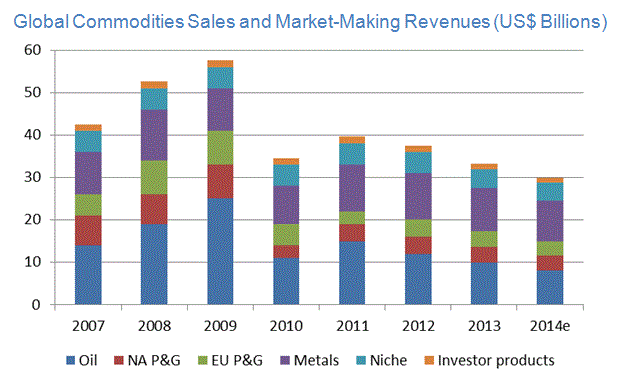Commodity Markets: Making Sense of the Upheaval
Abstract
Trading revenues in the global commodities market have fallen from US$39.6 billion in 2010 to less than US$30 billion in 2014. This steady decline also leaves the commodities markets far below their highest industry revenue of US$57.6 billion in 2009.
A plethora of regulations have constrained banking activities in the last few years, and Celent expects revenues for banks to continue to remain low and possibly decline further, as a number of banks stop trading in commodities.
In the report Commodity Markets: Making Sense of the Upheaval, Celent studies the decline of the role of the leading investment banks in the commodities markets. This is in stark contrast to the growth of independent commodities trading firms, ranging from Bunge and Olam, which focus mainly on agricultural commodities, to Vitol and Gunvor, which focus on sectors such as metals and energy, to firms such as Glencore and Trafigura that are present across all sectors of the commodities market. The trading firms have grown significantly and have also been involved in mergers and takeovers, such as that between Glencore and Xstrata.
There has been a decline in the global commodities revenues since 2009, with the exception of 2011. The estimates for 2014 are much lower than the revenues from 2008–2009. The decline in oil prices has been quite challenging for the industry as a whole.

"The independent commodity trading firms have benefited from the falling involvement of banks in commodities markets,” says Dr. Anshuman Jaswal, a senior analyst with Celent’s Securities & Investments practice and author of the report. “The industry regulators are also expected to recalibrate their focus and involvement accordingly in the next few years.”
The report begins with a market overview in which Celent considers the performance of the sector as a whole, and also the banking segment. This is followed by a section on the commodity trading firms, which are fast emerging as dominant players in the industry. Finally, Celent explores the effects of regulation on the various types of market participants.

